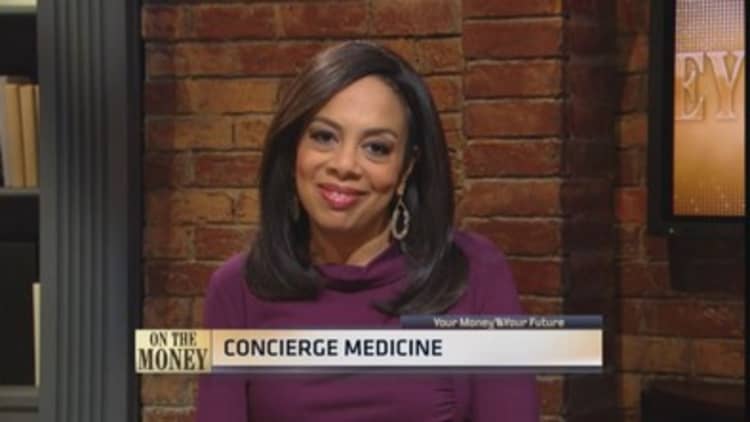
Paying for concierge health care—no longer a just a perk for the super rich—is growing in popularity.
With rising out-of-pocket costs, higher deductibles in their health plans and fewer doctors in provider networks, many consumers want to take more control of their health care. As a result, they are willing to pay a fee for immediate access and longer visits with their primary care physician.
Concierge doctors vary widely in terms of services offered, and several cost a pretty penny. Some high-end practices may charge a retainer fee of $5,000 a year or more for ongoing health management, certain testing and coordination of care with specialists.
Read MoreThe link between doctors and antibiotic resistance
Other concierge doctors will guarantee timely access for just $60 a month. Yet the majority of concierge physicians charge a monthly fee ranging anywhere from $135 to $150 per month for basic and preventive care, said Michael Tetreault, editor of Concierge Medicine Today.
There are three ways to figure out if a concierge doctor may be an affordable option for you:
Seeing a doctor more frequently
Financial advisor and physician Carolyn McClanahan says it's critical for people to first determine their "health care personality" before choosing a physician. "Do you want quick access to the doctor? Do you feel like you need to go all the time and that you need specialized services that having a doctor hold your hand constantly will help you with?" she asked.
"If that's what you want, then concierge medicine is likely for you," said Dr. McClanahan, founder of Life Planning Partners in Jacksonville, Florida.
Limitless access, longer visits
With this option, you'll often get more personalized care with a concierge doctor who you can email, text or call at any time. "If you're not feeling well at 8 p.m., you don't have to wait until morning to see me," said Dr. Ken Redcross, an internist in Eastchester, New York, who started a concierge practice in 2007.
Read MoreDoctors group joins fight against 'skyrocketing' drug prices
Appointments can last longer—30 minutes or more on average—because instead of seeing 3,000 to 4,000 patients, concierge doctors usually limit their practices to a few hundred. "Patients want to get to know their physicians and more important people want their physicians to get to know them," Dr. Redcross said. "When you have access and the doctor gives you the time, people feel empowered."
High deductible plans
Most concierge physicians accept insurance, but paying a retainer in addition to insurance premiums may seem to some consumers like they're paying twice. However, if you make some changes to your existing insurance plan, you may actually save money, Tetreault says.
You could have a high deductible health insurance plan that's paired with a health savings account. With a higher deductible, you'll have lower premiums. You can put the money that you save on premiums in a tax-exempt health savings account (HSA). Those funds can be used for any expense that is directly related to a qualified medical service that has been provided—including some fees paid to the concierge practice.
There are more than 4,000 concierge doctors in the U.S. today and 8,000 more are engaged in some type of "membership medicine", where patients pay a fee for specific services, Tetreault said. Concierge Medicine Today allows you to search for doctors currently accepting new patients on its website.
You can also find concierge doctors in your area through the American Academy of Private Physicians.




